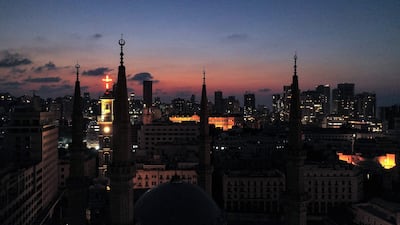It took two and a half years for Michel Aoun to be elected by Lebanon’s MPs as the country’s president. The leader of the Free Patriotic Movement, who turned 89 in September, did not emerge as a viable candidate until the final (and 46th) round of voting, on October 31, 2016. Earlier rounds were marred by shenanigans, including seven MPs voting for people who were no longer alive. Even on the day Mr Aoun was chosen, 890 days after his predecessor left office, two of the votes went to the pop star Myriam Klink and the fictional literary character Zorba the Greek.
For some of its more sardonic politicians, the almost-congenital degree to which Lebanese politics is prone to paralysis makes for easy fodder. But the joke has long since become tired. Mr Aoun’s term finished on Monday, and once again there is no president lined up to replace him. MPs have failed to agree on a suitable candidate.
The quagmire in which the country finds itself is made worse by the fact that Mr Aoun’s final act in office was to decree the resignation of the government led by Prime Minister Najib Mikati – a government that already resigned following parliamentary elections in May, and which has been governing in a strictly caretaker capacity ever since, as the new class of parliamentarians has been unable to form a cabinet. Mr Mikati has, in turn, argued that the presidential decree is illegal.
How a government already in a state of resignation could be ordered to resign, what that means and what happens next are all questions being fiercely debated by Lebanese constitutional lawyers. No president in Lebanon’s history has ever signed such a decree, and there is speculation Mr Aoun only did so to make it clear that the country’s ongoing political deadlock is untenable – as though this were not obvious enough to millions of Lebanese.
Under normal circumstances, the absence of a president in Baabda Palace would see presidential powers turned over to the government of the day – in this case, the one Mr Aoun just sought to delegitimise. Mr Aoun believes that a caretaker government should not be allowed to expand its powers to include the tools of the presidency. But in a presumed attempt to force clarity, he has only caused more disarray.
Whether any new order can be created from this chaos will depend on the ability of Lebanon’s political elite to scramble towards some grand bargain. MPs are due to meet on Thursday, and many eyes are looking to Nabih Berri, the Speaker of Parliament, for leadership. He is the only elected senior political figure remaining who retains his full position, though his party’s close relationship with the militant political party Hezbollah does not bode well for a progressive solution.
In the meantime, Lebanon can ill afford any more delays in getting a government – whether that be a cabinet or a president – together. The country is in the throes of an unprecedented financial crisis, which most of its politicians agree can only be fixed with the intervention of the International Monetary Fund. But the 2022 budget, passed only five weeks ago, fell short of the reform measures the IMF has said it requires for any rescue deal.
Voters, moreover, are naturally fed up but have little recourse. A widespread protest movement that began three years ago has lost its vigour, deflated by the evidence that no amount of discontent seems to bring about substantive change. For many months now, they have suspected that they are living in a country that has collapsed. Failing any monumental change this week, that conclusion will be certain.


